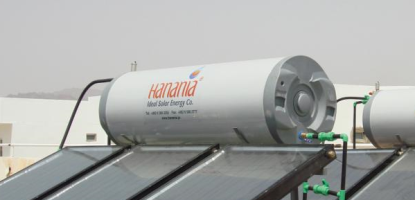

Jordan: Public-Sector Orders Push Market
 Jordan’s national collector industry has been benefitting from public-sector offers, as from the one in November 2013, when Jordanian collector manufacturer Hanania Solar Systems won a tender to deliver and install more than 2,000 solar water heaters for low-income households. The project was funded with a budget of USD 1.8 million by the Ministry of Energy and Mineral Resources in cooperation with the Jordan River Foundation. This March, the collector manufacturer announced on its website that it installed 2,137 solar water heaters in the first quarter of 2014. Samer Hanania, Assistant General Manager at Hanania, confirmed that the expected produced collector area of his company would increase by 50 % this year and reach around 70,000 m², according the World Map of Solar Thermal Industry published annually in international magazine Sun & Wind Energy.
Jordan’s national collector industry has been benefitting from public-sector offers, as from the one in November 2013, when Jordanian collector manufacturer Hanania Solar Systems won a tender to deliver and install more than 2,000 solar water heaters for low-income households. The project was funded with a budget of USD 1.8 million by the Ministry of Energy and Mineral Resources in cooperation with the Jordan River Foundation. This March, the collector manufacturer announced on its website that it installed 2,137 solar water heaters in the first quarter of 2014. Samer Hanania, Assistant General Manager at Hanania, confirmed that the expected produced collector area of his company would increase by 50 % this year and reach around 70,000 m², according the World Map of Solar Thermal Industry published annually in international magazine Sun & Wind Energy.
Photo: Hanania
The kick-off meeting for the big rollout was back in December 2013. Jordan River Foundation (JRF), a governmental non-profit body, signed an agreement with 70 local community organisations qualified to implement the project. Jordanians could then apply at one of them and had the option of paying for the solar systems in monthly instalments.
Solar water heaters reduce residential electricity bill by 85 %
“A typical solar water heater has 200 litres and three solar collectors of 1.32 m² each,” Hanania said. “The total price of the system is USD 615, including delivery and installation anywhere in Jordan.” The system is paid in 20 monthly instalments of USD 30, plus monthly interest of USD 1.4. Hanania explained that the loan-based purchase of solar water heaters was popular among the target group, since it cut down a household`s electricity bill to 15 % of its previous amount. He added the demand for the second JRF loan programme to purchase energy-efficient electrical appliances was lower because “all wished to purchase a solar thermal system”.
Jordan imports 95 % of its energy supply
According to Petra, the Jordan news agency, the Minister of Energy and Mineral Resources, Dr Mohammad Hamed, emphasised during the ceremony at which the agreements were signed that the initiative was “only one part of the national efforts to encourage rural communities to use renewable energies.” The kingdom, which imports over 95 % of its energy supply each year, is working on several renewable energy projects that will increase the local contribution of renewables.
The latest Regional Market Assessment Report in the Mediterranean Countries published in 2014 by Paris-based organisation Observatoire Méditerranéen de l’Energie (OME) counts three operating solar water heater manufacturers in Jordan, in addition to 10 retailers and 13 installers specialised in solar thermal technology. The authors estimate that imports make up a third of the total annual market volume. When asked about the challenges of the Jordanian solar thermal market, Hanania replied: “Imported low-quality products from China.”
More information